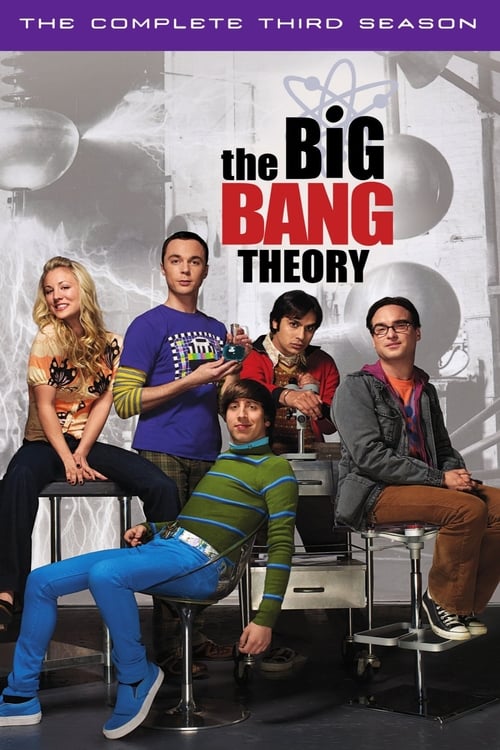
Ask Your Own Question
What is the plot?
In the season 3 premiere of The Big Bang Theory, titled "The Electric Can Opener Fluctuation," the episode begins with Leonard Hofstadter and Sheldon Cooper returning from a trip to the North Pole, where they had been conducting an experiment. They are excited about their findings, but their return is met with tension as Penny is upset with Leonard for not telling her about his trip. She feels neglected and expresses her frustration, leading to a confrontation where Leonard tries to explain his passion for science, but Penny is not satisfied with his excuses.
Meanwhile, Sheldon is dealing with his own issues. He is anxious about the potential changes in his living situation now that Leonard has returned. He fears that Leonard's relationship with Penny might disrupt their established routine. This internal conflict leads Sheldon to act out, creating a series of awkward and humorous situations as he tries to assert his dominance in their shared living space.
As the episode progresses, Leonard attempts to make amends with Penny by inviting her to a dinner at their apartment. He hopes to rekindle their friendship and possibly more. However, during the dinner, Sheldon's behavior becomes increasingly erratic, as he struggles to cope with the idea of change. He interrupts Leonard and Penny's conversation, making it difficult for them to connect. This culminates in a moment where Sheldon accidentally reveals Leonard's feelings for Penny, causing further tension.
In the next sequence, Leonard decides to confront Sheldon about his behavior. He expresses his frustration over Sheldon's inability to understand social cues and the importance of their friendship with Penny. This confrontation leads to a heartfelt moment where Leonard emphasizes the need for Sheldon to be more considerate of others' feelings. Sheldon, in his typical fashion, struggles to grasp the emotional weight of the conversation but ultimately agrees to try to be more accommodating.
The episode takes a comedic turn when Sheldon attempts to apologize to Penny in his own unique way. He presents her with a gift, which is a can opener, but his lack of social skills leads to an awkward exchange. Penny is confused by the gesture, and Sheldon's inability to express genuine emotion only adds to the humor of the situation. Despite the awkwardness, Penny appreciates the effort, and this moment serves to lighten the mood.
As the episode nears its conclusion, Leonard and Penny share a moment of vulnerability. They discuss their feelings and the complexities of their relationship. Leonard expresses his desire to be more than friends, while Penny reveals her own uncertainties. This conversation is pivotal as it highlights the emotional stakes for both characters, setting the stage for future developments in their relationship.
The episode wraps up with a humorous scene where Sheldon, still struggling with the concept of personal boundaries, tries to impose his own rules on Leonard and Penny's budding relationship. His insistence on maintaining control leads to a comedic standoff, showcasing the dynamic between the characters. The episode ends on a light note, with the group coming together to share a laugh, despite the underlying tensions that remain unresolved.
What is the ending?
In the season 3 finale of The Big Bang Theory, titled "The Lunar Excitation," the episode concludes with a significant development in the relationship between Sheldon and Leslie Winkle, while also showcasing Leonard's feelings for Penny. The episode ends with Sheldon and Leslie sharing a kiss, and Leonard, feeling rejected, is left to ponder his relationship with Penny.
Expanding on this, the episode begins with Sheldon and Leonard discussing their plans for the evening. Leonard is excited about a date with Penny, while Sheldon is more focused on his own interests. As the night progresses, Leonard's date with Penny does not go as planned. Penny is distracted and seems to be struggling with her feelings for Leonard, which leads to an awkward moment between them.
Meanwhile, Sheldon is approached by Leslie Winkle, a fellow physicist who has shown interest in him. Initially, Sheldon is oblivious to her advances, but as the night unfolds, he begins to engage with her more. Leslie's flirtation with Sheldon becomes more pronounced, and he finds himself intrigued by her attention. This marks a significant moment for Sheldon, who typically struggles with social interactions and romantic relationships.
As the evening continues, Leonard's date with Penny takes a turn for the worse when she admits that she is not ready for a relationship. This revelation leaves Leonard feeling dejected and confused about his feelings for her. He grapples with the idea of whether he should continue pursuing Penny or move on.
In a parallel storyline, Sheldon and Leslie's chemistry grows, culminating in a moment where they share a kiss. This is a pivotal moment for Sheldon, as it represents a breakthrough in his character's development. He experiences a rush of emotions that he typically keeps at bay, showcasing a different side of his personality.
The episode concludes with Leonard returning home, visibly upset about his situation with Penny. He finds Sheldon and Leslie together, which adds to his feelings of rejection. The contrast between Sheldon's newfound romantic interest and Leonard's heartbreak highlights the complexities of their friendships and romantic pursuits.
In summary, the episode ends with Sheldon exploring a new romantic avenue with Leslie, while Leonard is left to confront his unreciprocated feelings for Penny. Each character's journey reflects their individual struggles with love and friendship, setting the stage for future developments in their relationships.
Is there a post-credit scene?
In "The Big Bang Theory," Season 3, there is no post-credit scene in any of the episodes, including the specific episode titled "Season 3." The show typically concludes with the final scene of the episode, and viewers are not treated to additional content after the credits roll. The focus remains on the main storyline and character interactions throughout the episode, without any extra scenes following the credits.
What happens between Sheldon and Penny in Season 3?
In Season 3, Sheldon and Penny's relationship evolves significantly. Their dynamic is explored in episodes like 'The Maternal Capacitance,' where Penny becomes more comfortable with Sheldon, and they share a deeper emotional connection. Sheldon struggles with his feelings when he realizes he has a strong bond with Penny, leading to moments of vulnerability.
How does Leonard's relationship with Penny develop in Season 3?
Leonard's relationship with Penny continues to be a central focus in Season 3. They navigate the complexities of their romantic feelings, especially in episodes like 'The Electric Can Opener Fluctuation,' where Leonard's jealousy over Penny's interactions with other men becomes apparent. Their relationship is marked by ups and downs, showcasing Leonard's desire for a deeper commitment.
What is the significance of Sheldon's 'Roommate Agreement' in Season 3?
The 'Roommate Agreement' is a recurring theme in Season 3, particularly in episodes like 'The Maternal Capacitance.' Sheldon uses it to maintain control over his living situation with Leonard, but it also highlights his struggles with personal relationships. The agreement becomes a source of humor and tension, illustrating Sheldon's need for structure in his life.
How does Howard's character evolve in Season 3?
In Season 3, Howard's character is further developed, particularly in his interactions with women. His attempts to woo Leslie Winkle in 'The Excelsior Acquisition' showcase his overconfidence and insecurities. Howard's relationship with his mother is also explored, revealing his dependence on her and adding depth to his character.
What role does Raj play in the group dynamics during Season 3?
Raj's role in the group dynamics is significant in Season 3, especially as he navigates his own romantic interests. In episodes like 'The Plimpton Stimulation,' Raj's inability to speak to women without alcohol is highlighted, leading to comedic situations. His friendship with Howard and the others is tested as they deal with their own relationships, showcasing Raj's desire for connection.
Is this family friendly?
"The Big Bang Theory" is generally considered a family-friendly show, but it does contain some elements that may be objectionable or upsetting for children or sensitive viewers. Here are a few aspects to be aware of:
-
Mature Themes: The show often touches on themes related to relationships, dating, and sexual innuendos, which may not be suitable for younger audiences.
-
Social Awkwardness: Characters frequently experience social anxiety and awkwardness, which can be uncomfortable to watch for some viewers.
-
Intellectual Humor: The humor is heavily based on science and geek culture, which might be confusing for younger children who do not understand the references.
-
Occasional Strong Language: While not excessive, there are instances of mild profanity and suggestive language that may not be appropriate for all viewers.
-
Character Conflicts: There are moments of conflict and emotional distress among characters, which could be upsetting for sensitive viewers.
Overall, while the show is comedic and light-hearted, parents may want to preview episodes to determine their suitability for their children.


















